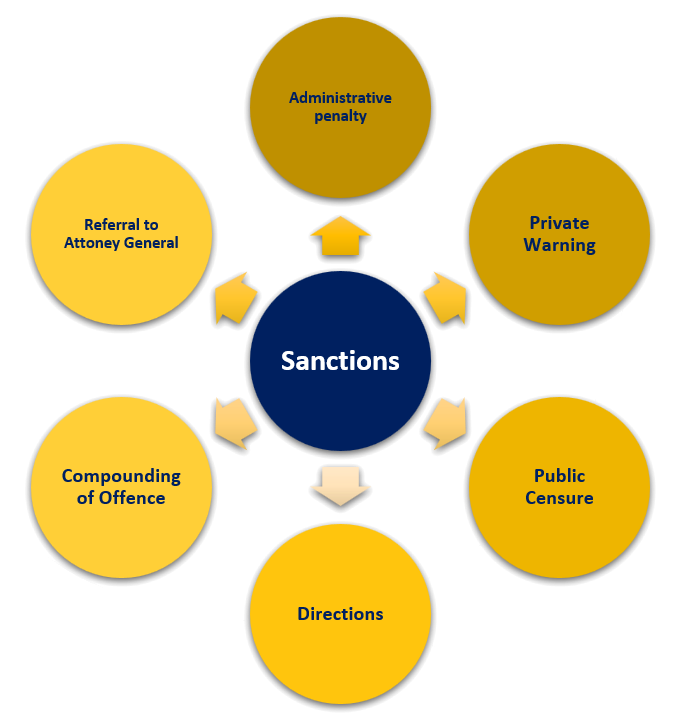Enforcement Process
The Enforcement Unit is responsible to determine the appropriate administrative measures in relation to AML/CFT breaches identified and to subsequently ensure, by engaging with the reporting person, that the failures identified are remediated. The approach adopted by the FIU in the Enforcement Process is driven by its mandate to achieve compliance and promote a high standard of business conduct within supervised sectors. In the discharge of its functions, an array of sanctions is set out in the legislation to deal with reporting persons who are found to be in breach of the law and fail to take corrective measures to remediate deficiencies identified. The enforcement measures will consider several factors such that the enforcement actions are effective, proportionate and dissuasive. The application of these enforcement actions varies according to the severity of the offence. In some cases, the FIU may decide to impose two or more sanctions simultaneously. The enforcement tools are illustrated in Diagram 1:

Potential breaches of AML/CFT obligations referred to the Enforcement Unit may be the result of the following, amongst others:
- An onsite or offsite inspection carried out by Supervision Unit which leads to the identification of breaches of AML/CFT obligations as stipulated in the relevant Acts;
- The reporting person failed to submit information requested by the FIU within the stipulated timeframe;
- The reporting person failed to submit periodical reports including report on corrective measures (also referred as remedial action plans) and request for information by the FIU; or
- The reporting person failed to register with FIU as reporting person despite conducting prescribed activities in the First Schedule of the FIAMLA.
Understanding the Enforcement Process
Administrative sanction
By virtue of its powers vested in Section 19N of the FIAMLA, the FIU may impose administrative sanctions which can be of pecuniary nature to reporting person (RP) who has intentionally and/or negligently committed an offence against the FIAMLA, the UN Sanctions Act and any relevant guidelines and regulations issued under those Acts.
The FIU is empowered under the FIAMLA to, inter alia,
- Issue public censure
- Issue private warning
- Impose administrative penalty
The following determining factors (aggravating and mitigations factors), amongst others, shall be considered to decide on the appropriate enforcement action for breach of any AML/CFT obligation:
- Nature and seriousness of the failure, violation, or contravention
- Duration of the failure, violation, or contravention
- Compliance history of the reporting person
- Compliance history with regard to the failure, violation, or contravention
- Whether penalties have been paid for the same failure, violation or contravention
- Disciplinary action taken against persons found to have committed the failure, violation, or contravention
- Nature of corrective action, if any, taken against the entity that committed the failure, violation or contravention
- Economic impact of the penalty to the person(s) or entity that committed the failure, violation or contravention
- Existence of concealment, fraud and/or intentional falsification
- Attitude of the Reporting person towards non-compliance
- any other factors as the enforcement process may, in the circumstances, deem necessary.
The list of factors stated above is not exhaustive and each breach will be assessed on a case-by-case basis. The Enforcement Unit will treat each breach on its own merits and assess the facts to decide on an outcome that is fair and proportionate based on the nature of the breach and mitigating circumstances. The Enforcement Unit may also levy a monetary penalty in conjunction with other sanctions as necessary and appropriate, in order to achieve compliance.
Where there is reasonable cause to believe that a reporting person has committed, is committing or is likely to commit a breach of the FIAMLA, UN Sanctions Act and any relevant regulations and guidelines, prior to impose any administrative sanction, the reporting person is granted an opportunity to submit his representation in writing within 21 days of the notice in accordance with Section 19N (2) (c).
The reporting person is required to show cause as to why regulatory action should not be taken against him. Following the written representation submitted by the reporting person and the FIU is satisfied that the latter has breached his AML/CFT obligations, or where no written representation has been received, the FIU shall impose the administrative sanction on the reporting person.
Any administrative sanction imposed against a reporting person will form part of his compliance history and shall therefore influence the FIU’s decision as to whether to initiate other enforcement action in relation to future breaches.
Issuance of private warning
In some cases, despite concerns about a reporting person’s conduct or evidence of that the reporting person has committed a breach of his AML/CFT obligations, the FIU may decide that it is not appropriate, having regard to all the circumstances of the case, to impose any of the other range of enforcement action at its disposal such as financial penalties or public censure. This remains consistent with the FIU’s risk-based approach to enforcement. In such cases, the FIU shall give a private warning pursuant to Section 19H(1)(d)(i) of the FIAMLA to warn reporting person that they came close to being subject to wider regulatory action. But there is no exhaustive list of the conduct or the circumstances which are likely to lead to a private warning rather more serious action. The FIU shall assess each case and take into account all the circumstances of the case before deciding whether a private warning is appropriate.
Issuance of public censure
In some cases, whereby the FIU is satisfied that the reporting person has breached his AML/CFT obligations and considered the offence as a serious one to warrant a publish a statement to that effect, it will impose public censure in accordance with Section 19H (1) (d) (ii) of the FIAMLA. An enforcement action like public censure will also raise awareness of regulatory standards and requirement and alter the reporting person’s behavior towards compliance and deter other reporting persons from engaging in comparable activities. Public censure demonstrates that the probability of getting caught and the size of the penalty outweigh any potential benefits from the misconduct.
Imposition of administrative penalty
An administrative penalty is a monetary penalty that can be imposed on reporting person who failed to comply with the requirements of the relevant acts, pursuant to Section 19(H) (d) (iii) of FIAMLA. A range of aggravating and mitigating factors are considered when assessing the quantum of the monetary penalty. In determining the administrative penalty, the FIU ensures that the sanction is proportionate, effective and dissuasive.
Any administrative penalty paid to the regulatory body shall be credited to the Consolidated Fund.
The Review Panel
Following the decision of the FIU, as regulatory body, to impose an Administrative Sanction on a reporting person, the aggrieved person may apply to the Review Panel within 21 days from the issue of the letter in accordance with Section 19S (1) of the FIAMLA, for a review of the decision of the FIU, specifying the reasons for the review. A copy of the application shall, at the same time, be filed with the FIU.
Directions
An enforcement direction is a written instruction issued by the FIU to the Reporting Person under its purview pursuant to Sections 19H or 19L of the FIAMLA, directing the reporting person to remediate any shortcomings identified within their AML/CFT system.
A direction issued by the FIU may require a reporting person to address deficiencies, for example update policies and procedures within a specific timeframe. A reporting person may also be directed to draw up an action plan to remedy the deficiencies found during an onsite or offsite inspection, with specific action items and target dates for the completion of each action item.
The FIU is also empowered to request a reporting person to appoint or remove a specified employee from a specified office, based on the findings identified, it determines that the relationship exposes the reporting person to extreme ML/FT risks.
Compounding of offence
The compounding of offence is essentially a compromise or arrangement of an agreement by the reporting person to pay a fine in lieu of the Office of Direct Public Prosecution (ODPP) initiating prosecution against the latter for an offence committed under the FIAMLA and the UN Sanctions Act. It is a tripartite arrangement among the FIU, ODPP and the reporting person. Any offence committed under the FIAMLA, the United Nations (Financial Prohibitions, Arms Embargo and Travel Ban) Sanctions Act or any regulations made or guidelines issued under those Acts can be compounded.
As per Section 19P (2) on payment of the compounding amount, no further proceedings shall be initiated under the FIAMLA against the reporting person for the same offence.
